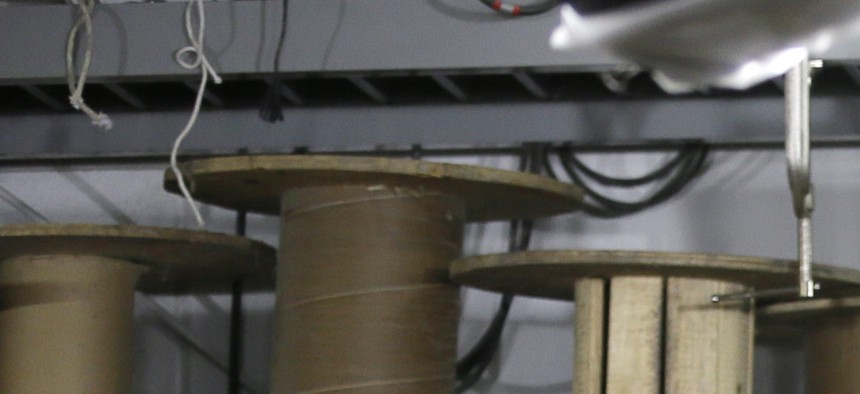Obama Praises Local Broadband Initiatives During Iowa Visit

President Obama speaks at Cedar Falls Utilities, Wednesday, Jan. 14, 2015, in Cedar Falls, Iowa Charlie Neibergall / AP Photo
In a visit to Cedar Falls, the president touts Next Century Cities’ efforts to bring higher Internet connectivity in localities nationwide.
President Obama praised an initiative launched last fall to help bring high-speed Internet connectivity to cities as part of an effort to encourage wider adoption of broadband.
Obama was in Cedar Falls, Iowa, on Wednesday and made remarks supporting efforts to expand high-speed Internet access to areas still relying on dial-up or other older Web portals.
Cedar Falls, home to the University of Northern Iowa, has been praised for being Iowa’s first “gigabit city,” in that it provides broadband access to residents as a quasi public service, similar to services provided by water and electricity utilities.
The 1-gigabit speed places Cedar Falls in the upper echelon of all U.S. cities—only 50 other areas provide similar speeds.
As part of the president’s visit, the White House praised the efforts of Next Century Cities, which is currently partnering with 55 U.S. cities in support of similar 1-gigabit speed initiatives, including Boston, Los Angeles, Seattle and dozens of other smaller localities, like Wilson, North Carolina, and Chattanooga, Tennessee.
According to NetIndex, the U.S. currently has average download speeds of approximately 32.1 megabits per second. That’s ahead of the combined world average of 21.9 but still lags behind several other nations. Overall, the U.S. ranks a dismal 14th in global broadband speeds, according to a recent “State of the Internet” ranking from Akamai.
As detailed previously by GovExec State & Local, Next Century Cities also aides in efforts to overcome state and local restrictions on broadband, which arguably hamper the ability of businesses, innovators and other individuals to pursue projects that benefit their communities at the economic, cultural and political levels.
“Next Century Cities exists because cities know they need to be in the driver’s seat if they want to deliver next-generation broadband to residents, businesses, and neighborhoods,” Deb Socia, executive director of Next Century Cities, said in a statement. “The President’s announcement shows the administration is listening—and responding. We welcome these commitments, and look forward to supporting any effort to help cities succeed.”
President Obama is expected to push for similar broadband expansion efforts during his State of the Union speech later this month.
However, his efforts at expanding broadband access and in supporting net neutrality have been met with stiff opposition from certain sectors.
On Wednesday, the U.S. Chamber of Commerce released a statement criticizing his policy and arguing that the private sectors is already doing a satisfactory job of improving broadband speed and access across the country.
“President Obama’s announcement supporting municipal broadband shows once again that the administration is ignoring the tremendous private-sector investment and innovation that is bringing increased broadband access and speeds to millions of Americans,” according to a statement from Bill Kovacs, the U.S. Chamber of Commerce’s senior vice president for the environment, technology and regulatory affairs. “Municipalities are creatures of state law, and in a system based on federalism, a federal agency should not negate centuries of cooperation.”





